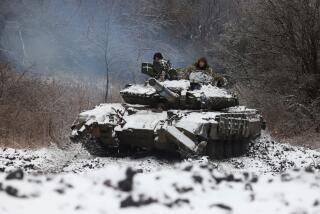Chechnya Tensions Heighten Threat of New War in Russia
- Share via
MOSCOW — In the wake of an assassination attempt on the Chechen president and menacing war games by Russian forces on the separatist republic’s doorstep, officials here and in Chechnya fear that another explosion of warfare may be near.
The latest incidents intensify an atmosphere of insecurity created by a spate of kidnappings and car bombings that has made the southern republic a lawless flash point despite a provisional peace agreement signed two years ago.
Russian President Boris N. Yeltsin, fearful of renewed combat and conscious of accusations that “the hand of Moscow” was involved in last week’s attack on Chechen President Aslan Maskhadov, has ordered his prime minister to the neighboring republic of Ingushetia to discuss the precarious peace with Maskhadov on Saturday.
Premier Sergei V. Kiriyenko’s talks with the Chechen leader in the Ingush capital, Nazran, will be the highest-level diplomacy in the suspended conflict since an Aug. 31, 1996, cease-fire halted 21 months of bloodletting.
But against the backdrop of soaring tensions and ill-timed army exercises in the North Caucasus region, Yeltsin’s political opponents have joined forces to highlight the Kremlin’s squandered chance to calm a republic that his troops savaged but never subjugated.
Nationalist Alexander I. Lebed, industrialist Boris A. Berezovsky, ousted Prime Minister Viktor S. Chernomyrdin and Mintimer S. Shaimiyev, president of the Tatarstan republic, this week appealed to Kiriyenko--and to the wary electorate--to act before Chechnya collapses once again into armed conflict.
“We have paid too dear a price for recent mistakes and silence,” the four men stated in a letter disclosed to Russian media simultaneously with delivery to Kiriyenko.
The writers pointed out with alarm that the republic has cut off Russian broadcasting, barred federal agencies from the territory, attacked Russian visitors and still holds captive Yeltsin’s personal envoy to the region, Valentin Vlasov.
Vlasov was kidnapped three months ago by forces presumed to be hostile to Maskhadov, a moderate Chechen rebel commander who is fighting a rear-guard action against ardent nationalists tired of waiting for a negotiated agreement on independence.
Three days after the attempted killing of Maskhadov--an ambush that destroyed his armored car and killed a bodyguard--Yeltsin fired Federal Security Service director Nikolai D. Kovalev without explanation, fueling speculation that the successor agency to the KGB had been involved in the attack on the Chechen leader.
“Too many things fit here: Immediately after [allusions] to the hand of Moscow, Yeltsin expressed his sympathy to his Chechen counterpart, ordered Kiriyenko to fly to Chechnya and fired the director of the Russian security service, as if apologizing to the Chechens,” the daily Komsomolskaya Pravda observed after Kovalev’s firing.
Analysts note that the appeal by the four prominent Russian figures has cast an embarrassing spotlight on the Yeltsin government’s failure to build on the 2-year-old peace agreement.
“Very regretfully, Russia lacks any coherent strategic or even transitional policy on the Caucasus problems and more specifically on the Chechnya problem, unless you can call an ostrich-like position a policy,” said Sergei Aryutunov, an analyst at the Moscow Institute of Anthropology and Ethnology.
By ignoring humiliating challenges like the kidnapping of Vlasov, the Kremlin has ceded this vital security issue to Yeltsin’s rivals, Aryutunov said.
“It may be considered a positive element that [the four men] publicly challenge the government over the Chechnya issue,” Aryutunov said. “But at the same time, it certainly adds points to the scoreboard of the four writers of the letter, each of whom is engaged in his own political campaign.”
Other observers have predicted that an alliance of Berezovsky’s money, Lebed’s populist appeal and Chernomyrdin’s ties with state oil and gas enterprises would keep the Chechnya issue foremost in voters’ minds as the campaign gets underway for the presidential race in 2000.
Lebed and Chernomyrdin have presented themselves as likely candidates, and Berezovsky has been keeping his options open by bankrolling and advising both men.
More to Read
Sign up for Essential California
The most important California stories and recommendations in your inbox every morning.
You may occasionally receive promotional content from the Los Angeles Times.














